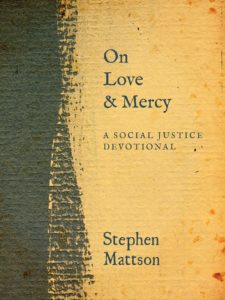
Podcast (beyond-the-page): Play in new window | Download
Subscribe: Apple Podcasts | RSS
“Look for the words ‘social justice’ or ‘economic justice’ on your church website. If you find it, run as fast as you can…am I advising people to leave their church? Yes!” – Glenn Beck
In the eleven years since conservative political commentator Glenn Beck shouted those words at his radio audience, the term “social justice” has increasingly taken on political baggage. Yet, at its core, social justice—justice in the realm of society—is a core element of Christian practice. It’s a hotly-debated topic and just the phrase alone can set people off. So when I found that Stephen Mattson had written a devotional called On Love and Mercy: A Social Justice Devotional, I knew I had to get him on the podcast to talk about it.
The Conversation | Stephen Mattson
This excerpt may be lightly edited for clarity and content. For the full interview, see the player above or visit us at your favorite podcast provider.
Josh Olds: We have to start with the term “social justice.”
Stephen Mattson: Yeah, so in the introduction of the devotional, I tried to lay it out as clearly as possible, because I think it is important to define terms. I mean, so many people can label anything according to what they believe it is. I define social justice simply as “justice within a society.” Pretty basic. So, I take the real semantic origins of the term “social justice,” and, justice means “the quality of being impartial and being fair” and social means “within society.” The term social justice, the way I define it, is, by its basic semantic definition, “justice within a society.”
I tried to bring it back to the Christian roots of the term. Nowadays, there is a lot of baggage associated with the term. A lot of people associate it with, like a Marxist or Communist plot, or liberal agendas or that type of thing. But it actually has a lot of traditional Christian history behind it. It’s even a large part of the Catechism of the Catholic Church, and it goes back hundreds of years. Christians have used it as a good thing, as something that was exemplified through Christ and His teachings.
I define social justice simply as “justice within a society.” – Stephen Mattson
Josh Olds: Knowing that there are going to be people who look at the cover of your book, and they see that term, and immediately they have a negative perception of you…How do you respond to Christians who do take a negative view of social justice?
Stephen Mattson: I try to find some common ground. You know, usually that starts with the person of Jesus. Both parties can start there where we both want to honor what we believe, to be Christ like and so I take examples of Jesus life—helping the poor, sick, calling out some of the wrongdoings or hypocrisy of the religious leaders of that day…I want to try to redeem the idea that social justice is a Christian tradition rooted in Christ and I found that when we bring things back to the words and actions of Jesus, it helps people and kind of disarms them from maybe some of the partisan ideology that they’ve adopted.
I wrote this devotional in an effort to try to guide us back to the centrality of Jesus. – Stephen Mattson
Josh Olds: What was the catalyst for you saying, “We really need a devotional that focuses on this topic?”
Stephen Mattson: I think when it became the most apparent to me was, within the last five or six years, we’re living in a time where there’s a global refugee crisis of epic proportions. One of the largest refugee crises the world has ever seen, you know, massive immigration crisis we have, you know, political divisions happening all over the world. Racism is a big political issue. Civil unrest with issues surrounding police brutality, and George Floyd’s murder, and all these injustices. And then a large portion of the church come together, and what did they do? They put out a statement against social justice. It felt like a huge disconnect between the reality of the world we’re living in and all these problems and all these life and death issues going on, and all the things that these churches that represented millions of Christians, they decided to put their time and energy into this theological statement condemning social justice and, and that really opened my eyes and like, “Whoa, what is going on here? We need to go back to the life of Jesus.” And so that’s why I wrote this devotional in an effort to try to guide us back to the centrality of Jesus.
The Book | On Love and Mercy
 A hopeful and Christ-centered devotional for Christians who know social justice to be a good and holy endeavor. On Love and Mercy is a 60-day devotional that invites readers to expand their vision of both personal faith in God and the redemptive and saving work of social action. Breaking down the premise that Christians must choose between being either socially conscience or theologically sound, author Stephen Mattson offers the hopeful message that Jesus–and Christianity–is both. Each day’s entry offers Christians who long to see justice and equity within society with a much-needed source of affirmation, solidarity, and encouragement.
A hopeful and Christ-centered devotional for Christians who know social justice to be a good and holy endeavor. On Love and Mercy is a 60-day devotional that invites readers to expand their vision of both personal faith in God and the redemptive and saving work of social action. Breaking down the premise that Christians must choose between being either socially conscience or theologically sound, author Stephen Mattson offers the hopeful message that Jesus–and Christianity–is both. Each day’s entry offers Christians who long to see justice and equity within society with a much-needed source of affirmation, solidarity, and encouragement.
These heart-felt devotions bring readers hope and encouragement to embrace social justice as the Christ-like discipline that it always was and is meant to be. On Love and Mercy validates social justice practices within the Christian faith by centering the example of Jesus as the ultimate standard.
Although our religion will fail us, Jesus never will. He walks alongside us in living out God’s commands us to love our neighbors to the best of our ability. Step into this journey and discover anew what it means to be devoted to Jesus and justice.
The Author | Stephen Mattson
 Stephen Mattson is a writer and activist whose work has been published in Relevant, Huffington Post, Sojourners, Red Letter Christians, and a variety of other venues. Mattson graduated from Moody Bible Institute, served as a youth pastor, and now works at University of Northwestern–St. Paul. He and his wife and children live near Saint Paul, Minnesota, and attend Woodland Hills Church. This is his second book.
Stephen Mattson is a writer and activist whose work has been published in Relevant, Huffington Post, Sojourners, Red Letter Christians, and a variety of other venues. Mattson graduated from Moody Bible Institute, served as a youth pastor, and now works at University of Northwestern–St. Paul. He and his wife and children live near Saint Paul, Minnesota, and attend Woodland Hills Church. This is his second book.
